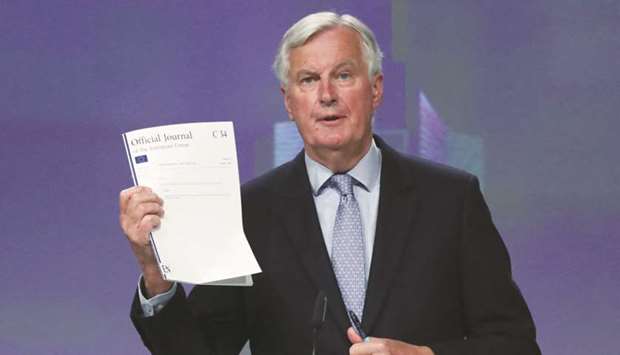Brussels and London pledged yesterday to step up the pace of Brexit trade talks to try to strike a deal by the end of October, after the latest round of negotiations ended with no major breakthrough.
EU chief negotiator Michel Barnier accused Britain of backtracking on divorce terms agreed last year as he reported “no significant progress” in four days of talks held by videolink because of coronavirus.
The former French minister set an October 31 deadline to reach an agreement on future EU-UK ties, to give time for it to be ratified before the end of the year.
Britain left the EU on January 31 and is now in a transition period until December 31, when it will leave the bloc’s single market and customs union — with or without a trade deal.
Barnier’s UK counterpart David Frost noted “limited” advances and asked that both sides “intensify and accelerate our work” in order to clinch the deal.
Barnier said the next round of talks would take place in late June or early July as officials talked of a busy summer ahead for negotiations.
“I have no doubt that we will find common ground over the course of the summer and by early autumn at the latest,” Barnier told a news conference in Brussels.
Barnier complained British negotiators were seeking to renege on commitments Britain’s Prime Minister Boris Johnson made in a political declaration with EU members last year.
Barnier said this declaration — legally a non-binding annex to the Brexit withdrawal agreement — could be the “only reference” for the talks.
Expectations among Brexit-watchers had been very low for this round of talks, and most in Brussels believe a breakthrough is not likely before the autumn.
But despite the lack of headline progress, there appear to be signs of movement in the negotiations.
Barnier hinted at compromise on the vexed issue of fishing rights — dear to several EU states including key player France — saying he was ready to “discuss what needs to be discussed”. And from the other side, a senior British negotiating official suggested willingness to accept tariffs on certain goods in return for flexibility on the EU’s so-called “level playing field” rules.
These are commitments to maintain EU standards on health, safety, state aid and the environment.
Britain says it wants to keep high standards but not be bound by Brussels regulations.
The focus now turns to talks between Johnson and EU chiefs Ursula von der Leyen and Charles Michel later this month.
The meeting will not involve the EU’s key national leaders, such as German Chancellor Angela Merkel or French President Emmanuel Macron, who will be decisive to any breakthrough.
This “high-level” meeting will also be the last chance for Johnson to ask for an extension to the negotiations beyond the end of the year when a transition period that keeps Britain aligned to EU rules comes to an end.
Johnson has categorically ruled out prolonging the transition period and the Europeans are working under the assumption that London will not change its mind.
London had earlier said it was prepared to ditch the process and walk away with no deal if not enough progress was made by June.
But the senior British negotiating official indicated this deadline no longer held, suggesting that progress by July would be enough keep going.
Some on the EU side fear that Johnson, who became prime minister on a promise to deliver a hardline Brexit, may not be serious about striking a trade deal, despite the consequences for the economy.
The negotiation flashpoints have remained the same since talks began in March.
London and Brussels starkly disagree on ways to assure fair competition under the terms of the trade deal, as well as how much access European fishing vessels will have to British waters.
France and other coastal states are looking to maintain as much access to British waters as possible, although Barnier has conceded the EU would have to budge.
The sense of urgency has also been sapped by the coronavirus outbreak that has made Brexit talks a lower priority in EU capitals.

EU’s Brexit negotiator Michel Barnier gives a news conference after Brexit negotiations in Brussels yesterday. Barnier accused Britain of backtracking on divorce terms agreed last year as he reported u201cno significant progressu201d in four days of talks, held by videolink because of coronavirus.
